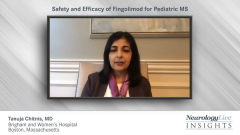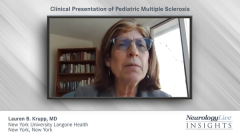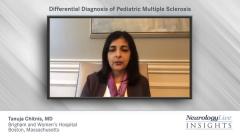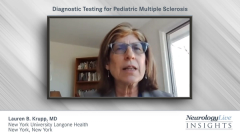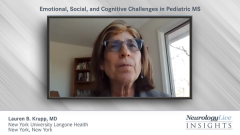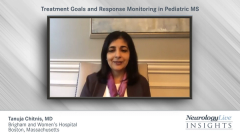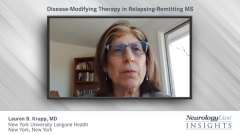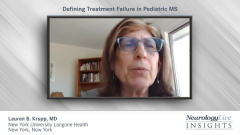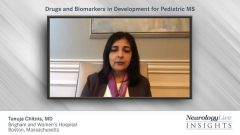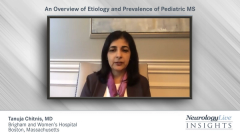
Safety and Efficacy of Fingolimod for Pediatric MS
Thought leaders in neurology discuss the results of the phase 3 PARADIGMS trial as well as the safety and efficacy of fingolimod for use in pediatric patients with multiple sclerosis.
Episodes in this series

Lauren B. Krupp, MD: In 2010, fingolimod, an oral sphingosine-1-phosphate modulator, was FDA approved in the United States and approved elsewhere in the world for the treatment of relapsing-remitting MS [multiple sclerosis]. Initially, the only way this drug could be used in the pediatric age group was to use it off-label. Fortunately in a trial years later, fingolimod was compared to interferon beta-1a intramuscular. The drug was shown to be highly effective and have a very favorable safety profile. This pill, which is taken once a day, works by sequestering lymphocytes that are circulating in the bloodstream in the lymph node. Normally as lymphocytes circulate in the blood, they will enter the lymph node and then leave it and rejoin the circulation. However, the medication interferes with the binding of the receptor that sits on the lymphocyte such that the lymphocyte can’t leave the lymph node. It’s trapped there and eventually implodes and dies. The result is that the circulating number of lymphocytes in the bloodstream in people who are on fingolimod is reduced.
On the other hand, those lymphocytes that are in your tissues, such as your liver or kidney or nasal passages, are not reduced; it’s only the ones that are circulating in the bloodstream. The reason all of that is helpful is that it’s the lymphocytes circulating in the bloodstream that we believe enter the blood-brain barrier and get into the central nervous system to cause the inflammation and damage associated with multiple sclerosis. The study in which fingolimod was compared to interferon beta-1a was the PARADIGMS study. It was designed to be similar to a study that was done in adults in which fingolimod was compared to interferon beta in adults with MS. If you look at the baseline characteristics of the kids compared to the adults, you can see some features that underlie some of the things I was talking about. The pediatric patients with MS had a higher proportion of enhancing lesions when they stated the study compared to the adults. However, their neurologic impairment levels were lower; that’s very characteristic of pediatric MS.
As far as the study went, fingolimod was clearly superior in reducing the number of relapses and in reducing the number of new and enhancing or enlarging lesions on MRI. It was also superior in terms of reducing the amount of brain volume loss or atrophy that occurred in these patients. The relapse rate in the fingolimod treated group was 0.12. This means that those kids were having a relapse less than every 8 years, whereas the relapse rate in the interferon beta group was greater significantly so that the patient group was having a relapse almost every other year. That’s a dramatic difference. The other clear advantage is that it’s a pill, and you don’t have to give yourself a shot. However, compliance is critical; kids have to be reminded to take their medication. There will be some who will absolutely not want to take a pill every day. Managing MS involves dealing with the person you’re facing, the family you’re working with, recognizing what’s realistic for this individual, and what aspects of the situation the family might or might not have control over.
Tanuja Chitnis, MD: There is 1 disease-modifying therapy for pediatric MS that is FDA-approved and is available in the US under the FDA guidance; this is called fingolimod or Gilenya. This is a daily pill, and patients can start this between the ages of 10 and 17. There has been a robust clinical trial that has shown the efficacy of fingolimod over what was previously the standard of care: interferon beta-1a, also known as Avonex. This study demonstrated an 82% superiority of fingolimod over interferon beta-1a in reducing relapses over a 2-year period. Overall, the study found that the drug was quite safe to administer to pediatric patients; there is a long-term extension phase of the PARADIGMS study, which is ongoing.
Fingolimod is a really important treatment for pediatric MS. Being the first to have launched a large phase 3 clinical trial, and having completed this trial and being FDA-approved, was a landmark for pediatric MS. This provided the first treatment for pediatric MS that was widely available, usually approved by most insurances, and also available in many areas of the world where there previously weren’t treatments for pediatric MS. Overall, this has changed the paradigm of treating kids with MS; it has gone from using the lesser efficacious treatments, such as interferon beta-1a or glatiramer acetate, to now being able to use these highly effective therapies such as fingolimod.
Lauren B. Krupp, MD: Because we now have such an effective medication for pediatric MS compared to the injectable alternatives, I think the approach has to be to go with a higher efficacy therapy than what we were using previously. Relapses are not good for kids; they miss school, there are cognitive consequences, they have to get steroids. We want to avoid relapses. We also want to avoid new lesions, and we want to avoid atrophy. In my view, it is not in most cases wise to use treatments that are likely to be associated with breakthrough disease, ongoing inflammation, and relapses, when we have alternatives that are much more effective.
Transcript Edited for Clarity
Newsletter
Keep your finger on the pulse of neurology—subscribe to NeurologyLive for expert interviews, new data, and breakthrough treatment updates.

